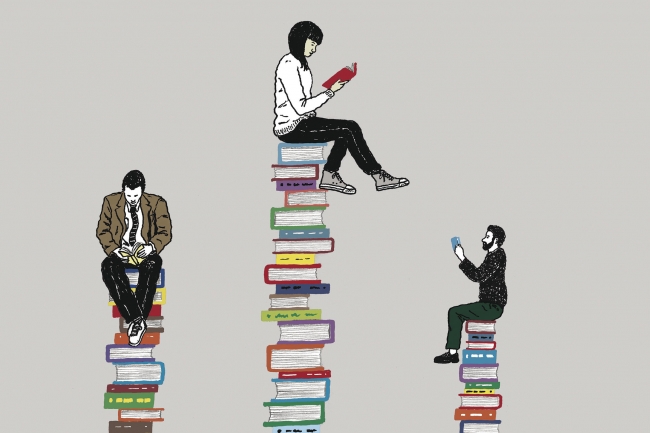
I was introduced to this metaphor as a graduate student during a talk on pedagogy by a brilliant, beloved English professor, and I remember how apt it seemed. Some of my favorite people have always been novels. They were my steady companions through adolescence and heady crushes in college, and I went to graduate school because I wanted to get to know them more intimately. Embarking on a doctorate seemed like the natural way to take our relationship to the next level.
The idea that books, like people, should be objects of affection seems perfectly natural today. What Deidre Shauna Lynch’s new book, Loving Literature: A Cultural History (University of Chicago Press), shows is that there is nothing self-evident or ahistorical about this relationship to literature. Observing that a common charge against contemporary literary scholars is that they don’t love books, she points out that this obscures a more fundamental question: Why should they?
Lynch’s book is part of a reflexive turn since the late 1980s, when literary scholars began to write histories of the institutions of literary production and criticism in which they themselves worked. Gerald Graff’s classic Professing Literature (1987) traces the development of English as an academic discipline in the United States since the mid-19th century, and the closely related problem of canon formation has received numerous historical and theoretical treatments, notably in Jonathan Kramnick’s Making the English Canon (1999) and John Guillory’s Cultural Capital (1993). So it has become common knowledge, Lynch observes, that “18th- and 19th-century Anglo-American culture reinvented ‘literature’ as a new sort of object of study, appreciation, marketing, and pedagogy.” Her contribution is to focus on changing forms of readerly attachments — sometimes possessive, sometimes grateful, sometimes perverse — to books and authors. Even though the category of “literature” has been recognized as constructed and historical, our relationships with books have continued to be taken for granted. Lynch shifts the spotlight from what it means to love literature to what it means to love literature.
That personal attachments are obscured is evident in the very idea of critical distance. In popular culture, this is portrayed as dry and stultifying, giving rise to the notion that analysis kills pleasure (witness the English professor’s bête noire, Robin Williams’s character in Dead Poets Society), and that the only ones who really love literature are the amateurs who have not been “subjected to the affective deformation” of a formal education. But, as Lynch observes, there’s an opposite version of this story. “We might say, instead, that the English professor’s affective life is supposed to slop over onto her job.” We bring our bedside reading into the office, and our classrooms regularly come to be invested with emotions more often associated with private domains of intimacy (here we might also think of students who treat office hours like ersatz therapy sessions). In any case, literary studies seems to confound our culture’s way of separating “‘personal life’ from the public sphere, feeling from knowing, and recreation from labor.”
How did it come to be, Lynch asks, that “those of us for whom English is a line of work are also called upon to love literature and to ensure that others do so, too”?
To answer the question, she turns to the discipline’s prehistory when the notion of a literary canon first emerged, and when readers first began to think of authors as friends. Focused on the period between 1750 and 1850, her account is organized according to four varieties of literary feeling: grateful love, possessive love, habitual everyday love, and elegiac love.
We don’t expect a biologist to love bacteria in the way we expect an English professor to love Jane Austen.
How we relate to literature is inextricable from the kind of thing we imagine it to be, and crucial to Lynch’s story is how perceptions of literature changed in the cultural imagination. Whereas an older rhetorical conception treated literature instrumentally, as a potentially useful repository of learning that could be gutted, excerpted, and digested without problem (much as we think of reference books and manuals today), the modern account that emerged in the 18th century understood literature as being “not a storage unit but a surrogate self.” Only conceived thus, as a person rather than a thing, did it make sense to regard the relationship between text and reader as though it were between individuals, and thus one that ought not be instrumentalized, but that instead solicits one’s affection and fidelity.
Such ideas about literature are part of our contemporary inheritance. We take for granted that literature is worthy of love.
But if it seems natural today that we can and do love literature, a popular strain of bibliophilia predicates that love precisely on its utility — in particular its capacity to make us better people. This is evident from the moral uplift of Oprah’s Book Club to Alain de Botton’s project of rewriting the Western literary canon in the genre of self-help. His London-based School of Life organizes retreats in sumptuous country estates, promising discussions about how books can change us and individual consultations with “bibliotherapists” who can make personalized recommendations. (One can only imagine the prescriptions — for greater stoicism, one dose of Hemingway; for better friendships, a splash of Montaigne; for cheerful optimism, avoid Beckett at all costs.) There’s little doubt that books can transform us. But transformation isn’t always comfortable — a book must be the ax for the frozen sea inside us, Kafka said. When literature is at once luxury commodity and magic pill, the change we seek from it is unlikely to be the kind that comes from being alienated, devastated, or having the ground under us whisked away.
The return to an instrumental view of literature is also evident in defenses of it from within the academy itself. Lynch’s premise that literary scholars today are accused of not loving books stems from the culture wars over what English departments should be teaching. For the generation of scholars coming of age now, that charge no longer holds the same urgency. The problem today isn’t that we’re accused of not loving literature, but that loving literature is an insufficient explanation — or what is increasingly demanded, justification — of what we do. When two much-discussed studies last year touted the benefits of reading literary fiction for levels of empathy, English departments gratefully seized upon them. The embrace of those studies as a vindication for the humanities was striking. These days, arguments from utility are the firmest ground around, and here at last, it seemed, was empirical evidence of the practical benefits of reading imaginative fiction — even if this meant accepting that literature’s value lies in its quantifiable effects. Love fails to speak the language of economic value.
One welcome feature of Lynch’s book is that it highlights the ways in which our feelings about literature can inform intellectual choices that are typically justified on epistemological grounds. To take a recent example, consider Franco Moretti’s controversial call to give up close reading in favor of “distant reading.” In his essay “Conjectures on World Literature,” Moretti observes of close reading: “At bottom, it’s a theological exercise — very solemn treatment of very few texts taken very seriously.”
A theological exercise, yes, but a lover’s wont, too. Close reading, Moretti points out, depends on an extremely small canon, which we have deemed exceptional and valuable and worthy of continual exegesis. Disputes over what belong in that canon, as valuable as they may be, have not radically changed the fact that we continue to treat a select group of texts like individuals — attributing to them agency, wisdom, and authority and placing them at the center of our affections.
One little-acknowledged reason that Moretti’s call for distant reading has been so contentious is that it challenges literary scholars’ relationships to our objects of study. To ask critics to treat George Eliot no differently than a penny dreadful, or to do away with explicating the complexity and playfulness of Shakespearean sonnets, is to ask us, in a way, to abdicate our readerly love, even if in our work those personal attachments are often mediated — if not masked — by the cool vocabulary of criticism.
Is the inextricability of feeling and knowing limited to literature departments? I’m not sure we’re unique among disciplines in blurring the boundaries between the professional and the personal. From the anecdotal evidence of friends in the sciences, emotional investments run deep in a range of fields, including the ones we usually consider the most dispassionate. It’s by no means clear that writing a computer program or demonstrating a mathematical proof is any less libidinally charged (or less aesthetic, for that matter) than explicating Anna Karenina, even if the role of affective labor is more repressed in the sciences.
Lynch is right, however, to point out that there’s something distinctive about the way an English professor’s affections are supposed to overlap with her work. We don’t expect a molecular biologist to love bacteria in the way we expect an English professor to love Jane Austen. This expectation has everything to do with what we imagine books to be, and it stems in part from the modern dissociation of literature from the domain of utility and the ideology of l’art pour l’art. We may expect biologists and physicists and economists to enter their disciplines because they care about furthering knowledge, discovering cures, or changing policy. But precisely because it’s so unclear what the immediate utility or relevance of literature is to “the real world,” we assume that the only reason to devote one’s professional life to it is because of personal attachments. Hence the idea of many humanistic fields as frivolous and self-indulgent.
All of which leads back to Lynch’s question: How has it come to be that “those of us for whom English is a line of work are also called upon to love literature and to ensure that others do so, too”? This question gains new urgency when considered in the context of today’s academy, where “love” is often supposed to compensate for the absence of compensation. As Miya Tokumitsu pointed out in Jacobin last year, the inspirational mantra “Do What You Love” (DWYL), attributed to sources as various as Confucius and Steve Jobs, divides work into two classes: “that which is lovable (creative, intellectual, socially prestigious) and that which is not (repetitive, unintellectual, undistinguished).” DWYL makes invisible the vast swaths of work (for instance, janitorial and caretaking) that aren’t deemed lovable, while the few lucky enough to pursue lovable work are disproportionally privileged in socioeconomic status, education, and race.
No one is suggesting that we shouldn’t all be able to do what we love. But as Tokumitsu noted, the danger of DWYL for the professions that it purports to celebrate is that it makes labor into something that is carried out for love alone, rather than for compensation.
Sacrificing material gain in order to do what you love will be familiar to many in academe. The idea harks back to Max Weber’s analysis of Beruf, work as the secular expression of a divine calling. As Weber wrote in his 1918 essay “Science as a Vocation,” whoever fails to feel “that the fate of his soul depends upon whether or not he makes the correct conjecture at this passage of this manuscript may stay away from science. … Without this strange intoxication, ridiculed by every outsider; without this passion … you have no calling for science and you should do something else. For nothing is worthy of man as man unless he can pursue it with passionate devotion.”
It’s a tall order to hang the fate of your soul on the correctness of your close reading, but Weber’s insight remains embedded in academic culture, which encourages the total identification of self with work.
As we know all too well, if science (in the broad sense of Wissenschaft, as Weber used it, rather than in the restricted sense of the natural sciences) is your vocation, the rewards for pursuing it today are increasingly meager: an employment market in which each year sets new records for job losses, soaring rates of adjunctification, downsized departments, and diminishing funding. Weber exalts “inner devotion,” which alone is able to “lift the scientist to the height and dignity of the subject he pretends to serve.” The ideal of pure devotion to one’s subject, often bound up with less-acknowledged personal attachments, is inculcated in myriad ways from the beginning of graduate school. This is perhaps especially prevalent at wealthy, elite private institutions, where someone may be deemed careerist, or worse, vulgar, for caring too much about whether her dissertation will render her employable.
To the rest of the world, including those who look at the professoriate with an eye to entering it, literature departments remain one of the few places where one can nurture and develop one’s love of books. But as the university becomes ever more corporatized, the question is whether academe can be a place where love coexists with work in a nonexploitative way.
It’s not that you shouldn’t go to graduate school to study what you love. In my darkest hours on the job market, when I contemplated leaving the profession, I never regretted the luxury that graduate school gave me — the time and space to read slowly and think deeply. The encounters I had with books and other readers recast the boundaries of my experience and made the world a richer, more complex, more interesting place. But let’s also be clear-eyed about the situation on the ground, and drop the myth of intellectual purity that being driven by love for one’s work is mutually exclusive with wanting decent compensation — or that it’s vulgar to say so.
None of this means turning our backs on love or literature. On the contrary, the affective ties that Lynch deftly historicizes in her book can be invoked to make a case for literary studies today, by taking more seriously the idea that love calls forth an ethical responsibility not to relentlessly instrumentalize. J.M. Coetzee, in the sober foreword to the University of Cape Town literature professor John Higgins’s 2013 book Academic Freedom in a Democratic South Africa, praises his friend’s “strategic defence of academic freedom.” This defense, the kind that stands a chance of “swaying the relevant decision-makers,” is the kind of argument that says humanistic training is necessary to produce critically literate citizens. There’s nothing wrong with taking this tack, Coetzee reasons, except that it runs aground on its own logic. If the upshot of a liberal education is critical literacy, and critical literacy is just a skill, why not simply teach the skill itself in, say, a pair of courses? Wouldn’t that be much cheaper and simpler than supporting an entire humanities faculty? As Coetzee rightly argues, many American universities have already begun to do this under the rubric of “freshman composition.” In similar fashion, instrumental defenses of literature that accept a narrow metric of quantifiable value are doomed to flounder. Why not just devise an empathy-training program, if that’s what we’re after? Why bother reading 3,000 pages of Proust?
In the end, “I believe, you will have to make a stand,” Coetzee writes. “You will have to say: We need free inquiry because freedom of thought is good in itself. We need institutions where teachers and students can pursue unconstrained the life of the mind because such institutions are, in ways that are difficult to pin down, good for all of us: good for the individual and good for society.” Nowhere does — or would — Coetzee invoke love, but love can provide an important ground for this kind of argument. If, for early modern readers, coming to love books meant coming to treat them not as things to be used but as things to be appreciated, then doubling down on the potency of those emotional commitments and their ethical entailments might be a way to resist the instrumental rationality of market values today. If we are serious about our love of literature, its study can be justified on its own terms, for love needs no justification. We read literature not because it is good for this or that, although there’s little doubt it does us all good.

